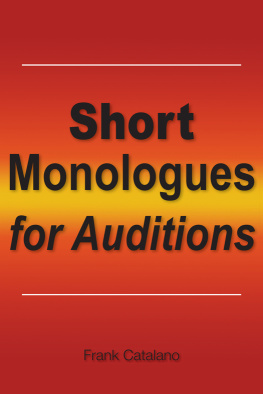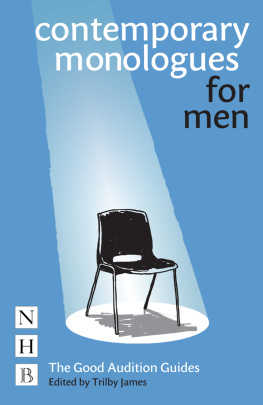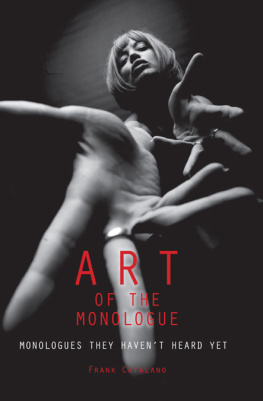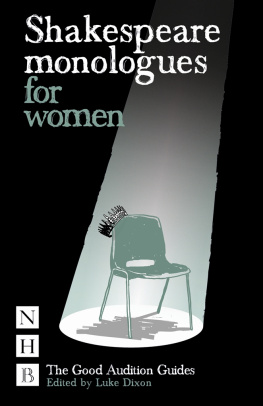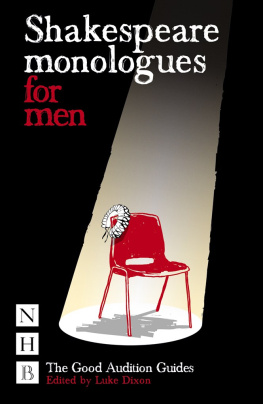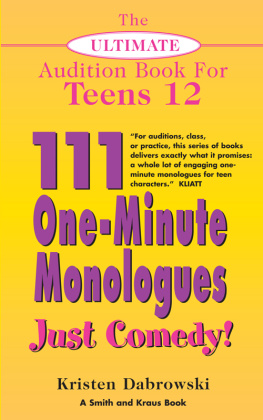WHY WE WROTE THISBOOK
If youve ever had trouble finding a suitable Shakespearean monologue for classwork or auditionsnever mind then preparing ityoure not alone. We both remember trying to find an appropriate monologue by searching a volume of Shakespeares complete works for any block of text with a womans name attached, and then combing the text of the surrounding scene to try to figure out the womans age, character, and circumstances. Once wed found a suitable piece, we were faced with the daunting task of making sense of it. We often commiserated with other actors, who, like us, wished that there were one comprehensive resource that would not only assist an actor in selecting a monologue, but would also annotate it thoroughly; explain the texts references to history, mythology, folklore, and the science of the times; and illuminate acting options presented by Shakespeares use of meter and other poetic and rhetorical devices. Over the years, we have encountered many actors whose lack of familiarity with these elements deterred them from performing Shakespeare. We hated the thought that actors were missing out on the thrill weve experienced when bringing Shakespeares words to life, and so we set out to create the resource we and our peers had long wished for. Here it iswe hope that the tools it contains will help you to make confident, creative choices and to revel in the joy of playing Shakespeare.
During the Elizabethan era, the Protestant Reformation took firm hold in England, and nationalistic sentiments rose in response to the constant threat of Counter-Reformation forces in Europe. These feelings fueled a strong interest in English history, which in turn gave rise to the development of a popular new theatrical genre, the history play. For the most part, history plays drew their material from the most authoritative historical sources of the time, Raphael Holinsheds Chronicles of England, Scotland and Ireland (second edition, 1587) and Edward Halls The Union of the Two Noble and Illustre Families of Lancaster and York (1548), both of which reflected the trend toward pro-Tudor historical propaganda encouraged by Henry VII, the first monarch in the Tudor dynasty. With their history plays, Elizabethan playwrights carried on this pro-Tudor approach to please Henry VIIs granddaughter, Elizabeth I. Although Shakespeare, who is credited with inventing the genre, was not immune to this pressure, his plays were far less propagandistic than those written by his contemporaries. Unlike his colleagues works, Shakespeares Histories examined political dilemmas with a depth that makes them still resonant today. Perhaps for this reason, his are the only examples of the genre still widely read and performed.
PHILIP THE BASTARD
GENDER: M
PROSE/VERSE: blank verse
AGE RANGE: adult to mature adult
FREQUENCY OF USE (15) : 2
Philip the Bastard has just come up in the world: he and his brother Robert sought King Johns arbitration of their dispute over their fathers inheritance. Dad left all the land to Robert, in a will that Philip, as the older son, naturally contested. Having realized that Philip is actually the bastard son of the late King Richard I, Queen Elinor has made her grandson an offer he cant refuse: she has just invited him to join her in fighting France, if he will relinquish his lands to Robert. Philip has jumped at the chance, and King John has knighted him, then and there, Sir Richard Plantagenet, after his father. The Bastard is delighted at his sudden social advancement. He gladly says goodbye to his brother and his lands, then muses over his new social status:
Brother, adieu. Good fortune come to thee,
For thou wast got i th way of honesty.
[ Exeunt all but the Bastard ]
A foot of honor better than I was,
But many a many foot of land the worse.
Well, now can I make any Joan a lady.
Good den, Sir Richard!God-a-mercy, fellow!
And if his name be George, Ill call him Peter,
For new-made honor doth forget mens names:
Tis too respective and too sociable
For your conversion. Now your traveler,
He and his toothpick at my worships mess,
And when my knightly stomach is sufficed,
Why then I suck my teeth and catechize
My picked man of countries: My dear Sir,
Thus leaning on mine elbow I begin
I shall beseech youthat is Question now,
And then comes Answer like an Absey book:
O Sir, says Answer, at your best command,
At your employment, at your service, Sir.
No, Sir, says Question, I, sweet Sir, at yours.
And so, ere Answer knows what Question would,
Saving in dialogue of compliment,
And talking of the Alps and Apennines,
The Pyrenean and the River Po,
It draws toward supper in conclusion so.
But this is worshipful society,
And fits the mounting spirit like myself;
For he is but a bastard to the time
That doth not smack of observation,
And so am I, whether I smack or no:
And not alone in habit and device,
Exterior form, outward accoutrement,
But from the inward motion to deliver
Sweet, sweet, sweet poison for the ages tooth
Which, though I will not practice to deceive,
Yet, to avoid deceit, I mean to learn,
For it shall strew the footsteps of my rising.
But who comes in such haste, in riding-robes?
What woman-post is this? Hath she no husband
That will take pains to blow a horn before her?
O me, tis my mother. How now, good Lady
What brings you here to court so hastily?
180 adieu goodbye (French); Good fortune thee May good fortune come to you; 181 got begotten, fathered; way of honesty honest way [got honesty conceived within wedlock]; 182 A foot of honor better a foot higher in reputation and good name; 183 many a many foot a great many feet; 184 Joan peasant girl; lady common term for a woman of high social standing; 185 Good den good evening; God-a-mercy God have mercy; may God reward you (a way of saying thank you, used in response to a respectful greeting from an inferior); fellow a form of address to a servant or inferior; 188 respective respectful; 189 conversion change for the better (i.e., change from lower to higher social rank); 190 my worships my (giving himself a title of honor); mess dining table (where they dine as befits the Bastards high rank); 191 sufficed satisfied, full; 192 catechize teach by means of questions and answers; 193 pickd (1) refined; (2) chosen; man of countries traveler [ My pickd countries (1) My refined traveler; (2) the traveler I chose (to invite to dinner)]; 195 I shall beseech you I ask you (he is being overly solicitious and polite); Question referring to the questioner (himself); 196 Answer referring to the answerer (the traveler); Absey book (AYB-see) ABC book, childs primer (which sometimes included a catechism); 197 at your best command I am at your best command; 200 ere before; would wants; 201 Saving except for; dialogue of compliment polite conversation, small talk; 202 Apennines (A-puh-NINES) mountains in Italy; 203 Pyrenean (PEER-eh-NEE-an) mountains between France and Spain; River Po a river in Italy; 204 It draws toward supper in conclusion so time passes between dinner and supper in this fashion; 205 worshipful society two meanings: (1) the honorable, respectable set (to which he now belongs); and/or (2) reverent, worshipping company (the company of flatterers such as the traveler); 206 fits (1) befits, is appropriate for; (2) is pleasing to; mounting rising (in social rank); 207 but nothing but, only; bastard to the time i.e., unfashionable, out-of-date person; 208 That who; smack of have a taste of, hint of; observation experience (knowledge gained by observing); 209 smack here, he puns on the word smoke; no not; 210 alone only; habit clothing; manner of dressing; device the cut and trim of a garment; 211 accoutrement accessories; 212 motion inclination, impulse; deliver speak, serve up; 213 Sweet, sweet, sweet poison i.e., extreme flattery; for the ages tooth i.e., pleasing to the tastes of this era; 215 Yet rather; to avoid deceit to avoid being deceived, to avoid being had [ And not alone I mean to learn I intend to learn not only to dress fashionably and have the outward trappings of a nobleman, but also to develop the impulse to speak in the flattering manner of the timenot to deceive others, but to avoid being taken for a ride by them]; 216 strew the footsteps throw petals in the path of (sweeten the path of); my rising my advancement in society; 218 woman-post female messenger (it would be insulting for a gentlewoman to be mistaken as such); 219 blow a horn before her i.e., to announce her arrival, as would befit a woman of stature; 220 How now What are you doing here?


